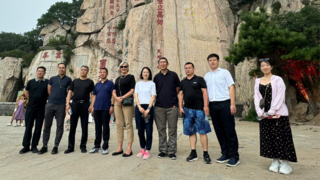China trip: Energy-efficient construction projects
Pressing ahead with energy-efficient construction in China and Germany: dena has been supporting cooperation between these two countries for 16 years. Ang Ye, Team Leader International Construction, provides an overview of dena's activities in China.

In recent years, energy efficiency and carbon reduction have become a common focus for many countries in the light of increasing global climate change. As important economies in the world, Germany and China bear a significant responsibility for the energy transition and climate action.
To achieve the goal of climate neutrality and promote the development of green buildings, dena and Chinese companies have embarked on a multi-faceted and wide-ranging collaboration to drive energy saving and carbon reduction in the construction sector through technological innovation and policy support.
Over 15 years of partnership
In 2008, we started working with the Centre for Science and Technology Development & Industrialisation (CSTID). In 2010, the Sino-German programme for energy-efficient construction was launched, which further promoted cooperation between the two countries in the field of sustainable construction. In 2015, the EcoCity project was launched, which represented an important step towards sustainable urban development. By 2020, there were already 27 EcoCity pilot cities.
The Sino-German Transformation Park project was launched in 2021. Almost 50 demonstration projects for energy-efficient buildings have been completed in 12 provinces and four climate zones as part of this initiative. In the same year, both countries also launched a consultation and certification programme for zero-carbon buildings. A roadmap was developed in 2023 to support the decarbonisation of the building and construction sector in the Guangdong-Hong Kong-Macao Greater Bay Area in China.
Trip to China in 2024
In July 2024, we travelled with the international construction team and dena Managing Director Kristina Haverkamp to visit a number of projects in situ. We visited Beijing, Tai'an, Bozhou and other Chinese cities to consolidate and promote German-Chinese cooperation in the field of climate-neutral buildings and districts.
In Beijing
On 10 July, representatives of the Beijing Research and Development Center for Building Energy Efficiency (BCEE) and dena officially opened the ‘China Exchange and Training Center’. This opened a new chapter in the future cooperation between the two parties. The BCEE and dena signed a framework agreement in 2018 to continue the closer cooperation and for the BCEE to become dena's core partner in China. The centre's recent involvement in the certification of the Boao Zero-Carbon Demonstration Zone in Hainan in particular has attracted a great deal of attention both at home and abroad.
On the same day, the dena delegation visited the China General Building Design and Research Centre (CCTC) in Beijing. Kristina Haverkamp emphasised during the discussion that the CCTC, as an important partner for the Chinese side, will work together with the CCTC on the establishment of life cycle management systems at architectural, regional and urban level. The aim is to validate the technology, share experiences and create demonstration projects.
In Tai'an
The signing ceremony of a cooperation agreement between the city government of Taian (Shandong province) and dena took place on the afternoon of 11 July. The city wants to work with dena in the long term to further develop climate-neutral buildings and districts. The cooperation agreement stipulates that both sides adhere to the principles of ‘complementary advantages, synergetic development, joint utilisation of resources and mutual benefit’.

In Bozhou
On 12 and 13 July, the dena delegation visited the Sino-German Low Carbon Eco-City in Bozhou (Anhui province). A discussion with Zhou Wei, Chief Economist of the Chinese Society for Urban Studies (CSUS) and a tour of the site were on the agenda. One of the things the team saw was the use of the Coolwa AI robot at first hand. This is an autonomous cleaning machine that is currently in the pilot phase.
During the concluding discussion, Kristina Haverkamp emphasised in her presentation that the development park in Bozhou was certified as a ‘Chinese-German eco-city with low CO2 emissions’ last year. This recognition highlights Bozhou's success and progress in building a sustainable and environmentally friendly city. The implementation of energy-saving solutions, the promotion of renewable energies and the creation of intelligent infrastructures will make a valuable contribution to climate action and the quality of life of the city dwellers.
Cooperation with a future
dena is looking forward to further dialogue and cooperation with its Chinese partners.
Greater bilateral cooperation facilitates the exchange of expertise, accelerates technological innovation and supports the implementation of sustainable construction practices. Joint research and development projects can enable
Germany and China to develop more efficient solutions to meet the challenges of sustainability more quickly. Synergies can also be created by pooling resources and defining common standards for sustainable construction and energy efficiency.